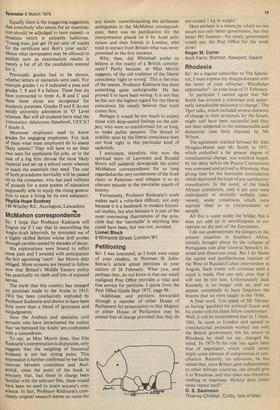Rhodesia
Sir: As a regular subscriber to The Spectator, I must express my disappointment with the tenor of your editorial—'Rhodesian opportunity'—in your issue of 21 February.
In particular I cannot agree that `Mr Smith has evinced a continual and apparently ineradicable resistance to change'. The Tiger talks, which included several elements of change in their proposals for the future, might well have been successful had they not been subjected to the unreasonable and dictatorial time limit imposed by Mr Wilson.
The agreement reached between Sir Alec Douglas-Home and Mr Smith in 1971, which embodied a far greater degree of constitutional change, was wrecked largely by the delay before the Pearce Commission was convened and arrived in Rhodesia, thus giving time for the inevitable intimidation which destroyed the hope of any satisfactory consultation. In the event, of the black African population, only 6 per cent were individually or severally verbally interviewed, under conditions which were scarcely ideal as to circumstances or sample.
All this is water under the bridge, but it does not add up to unwillingness to cooperate on the part of the Europeans.
I do not underestimate the dangers in the present situation in Southern Africa, initially brought about by the collapse of Portuguese rule after General Spinola's illtimed and disastrous coup. But I do blame the supine and pusillanimous reaction of the West to Russian/Cuban intervention in Angola. Such events will continue until a stand is made. One can only pray that it will not be too late. Unfortunately Jack Kennedy is no longer with us, and we appear completely to have forgotten the lessons that we were taught in the 1930s.
A final word. You speak of Mr Nkomo as having 'gambled his political future and his credit with his black fellow countrymen'. Well, it will be remembered that in, I think, 1961, he came to London and agreed to constitutional proposals worked out with the British government—On his return to Rhodesia he, shall we say, changed his mind. In 1975-76 his role has again been that of negotiator, which would surely imply some element of compromise or conciliation. Recently, on television, he has stated that, since Britain gave independence to other African countries, she should give it to Rhodesia, and that there was therefore nothing to negotiate. History does sometimes repeat itself!
0. S. Swainson Thie-ny-Chibbyr, Colby, Isle of Man


































 Previous page
Previous page